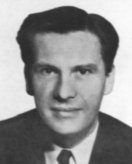Ludovic Kennedy
(journalist) | |
|---|---|
 | |
| Born | Ludovic Henry Coverley Kennedy 1919-11-03 Edinburgh, Scotland |
| Died | 2009-10-18 (Age 89) Salisbury, Wiltshire |
| Nationality | British |
| Alma mater | Eton College, Christ Church (Oxford) |
| Children | • Alastair • Ailsa • Rachel and Fiona |
| Spouse | Moira Shearer |
| Member of | Bullingdon Club, The Other Club |
British author of several books on miscarriages of justice | |
Sir Ludovic Henry Coverley Kennedy was a Scottish journalist, broadcaster and author best known for re-examining cases such as the Lindbergh kidnapping and the murder convictions of Timothy Evans and Derek Bentley, and for his role in the abolition of the death penalty in the United Kingdom. He was also a proponent of Scottish independence[1].
Early life
Kennedy was born in 1919 in Edinburgh,[2] the son of a career Royal Navy officer, Edward Kennedy, and his wife, Rosalind Grant, daughter of Sir Ludovic Grant, 11th Baronet. His mother Rosalind was a cousin of the Conservative politician Robert Boothby, later Lord Boothby. He had two younger sisters, Morar and Katherine. Morar married the playwright Royce Ryton in 1954. Katherine married Major Ion Calvocoressi in 1947. He was schooled at Eton College and studied for a year at Christ Church, Oxford, until the outbreak of war.[3]
While at Oxford he was a member of the Bullingdon Club.[4]
Ludovic Kennedy followed his father into the Royal Navy; he served as an officer on destroyers, mostly in the same northern seas. His ship, HMS Tartar, was one of those that pursued the battleship Bismarck following the Battle of the Denmark Strait. He witnessed the final battle, until Bismarck was ablaze and its crew began to abandon ship but shortage of fuel forced Tartar to depart for home before Bismarck sank. Kennedy later wrote about this in his 1974 book Pursuit, his chronicle of the chase and sinking of Bismarck.[5]
Kennedy's father, by then a 60-year-old retired captain, returned to the navy and was given command of HMS Rawalpindi, a hastily militarised P&O steamship, known as an Armed Merchant Cruiser.[3] On 23 November 1939, while on patrol southeast of Iceland Rawalpindi encountered two of the most powerful German warships, the small battleships (or battlecruisers) German battleship Scharnhorst} and Gneisenau trying to break out through the GIUK gap into the Atlantic. Rawalpindi was able to signal the German ships' location back to base. Despite being hopelessly outgunned, Kennedy decided to fight, rather than surrender as demanded by the Germans. Scharnhorst sank Rawalpindi; of her 312 crew, 275 (including her captain) were killed. Kennedy was posthumously mentioned in dispatches and his decision to fight against overwhelming odds entered the folklore of the Royal Navy.[6] His son Ludovic was 20 years old.
Miscarriages of justice
He wrote several books that questioned convictions in a number of notable cases in British judicial history. One of the first miscarriages of justice he investigated was the conviction and hanging of Timothy Evans in his 1961 book Ten Rillington Place (ISBN 978-0-586-03428-6). Evans was found to have murdered his baby daughter in 1950, but Kennedy contended that he was innocent, and that the murders of his wife and baby had been committed by the serial killer John Christie.[7] Christie was hanged three years after the hanging of Evans, following the discovery of six more bodies at 10 Rillington Place, none of which could be ascribed to Evans. Indeed, two of the skeletons found at the house dated back to the war – long before Evans and his family had moved in. After a long campaign, Evans was posthumously pardoned in 1966. The scandal helped in the abolition of the death penalty in the UK.
In 1985, Kennedy published The Airman and the Carpenter (ISBN 978-0-670-80606-5), in which he argued that Richard Hauptmann did not kidnap and murder Charles Lindbergh's baby, a crime for which he was executed in 1936.[3]
In 2003, he wrote 36 Murders and 2 Immoral Earnings (ISBN 978-1-86197-457-0), in which he analysed a number of noted cases, including the Evans case and those of Derek Bentley and the Birmingham Six, a number of which were affected by claims of police failure, police misconduct or perjury. In it he concluded that
“the adversarial system of justice in the UK and the United States "is an invitation to the police to commit perjury, which they frequently do"”
Ludovic Kennedy (2003) [8]
References
- ↑ http://news.bbc.co.uk/2/hi/uk_news/2207576.stm
- ↑ https://www.telegraph.co.uk/news/obituaries/politics-obituaries/6374967/Sir-Ludovic-Kennedy.html
- ↑ a b c http://www.timesonline.co.uk/tol/news/uk/article6880739.ece
- ↑ https://www.theguardian.com/media/2009/oct/19/ludovic-kennedy-dies-89
- ↑ ennedy, Ludovic (1974). Pursuit: The Chase and Sinking of the "Bismarck".
- ↑ https://www.theguardian.com/media/2009/oct/19/ludovic-kennedy-dies-aged-89
- ↑ https://www.rcwlitagency.com/books/36-murders-and-one-immoral-earnings/